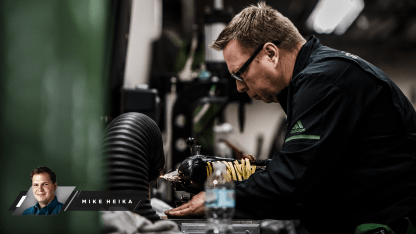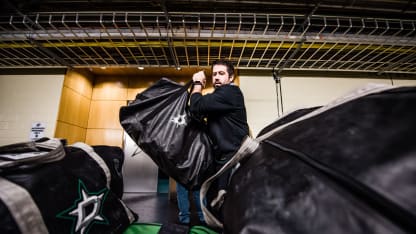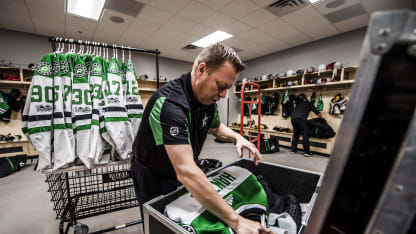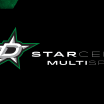Imagine moving every day.
Y'know, the thing you dread every two years or five years or 15 years?
Yep, imagine doing it for 82 games - to and fro. Imagine the packing and unpacking and planning and fretting. That's the reality for the Stars equipment staff, which navigates moves between Frisco and Dallas, between American Airlines Center and Love Field, between Winnipeg and Calgary and Edmonton and Vancouver.
"They're the heartbeat of the team," said Stars general manager Jim Nill. "They're leaving at four in the morning, they're coming in at six in the morning, they do things behind the scenes that people would be amazed by. They live off about three hours of sleep, and it's like that from August until we're done."
What goes into getting Stars game ready? Time, sweat and tireless work
From packing to planning, Dallas' equipment staff truly is 'the heartbeat of the team'

Head equipment manager Steve Sumner is in his 18th season with the Stars. Assistant equipment manager Dennis Soetaert is in his 13th. The fact the duo has been together so long and has such extensive experience means that they do their jobs quietly and systematically with little fanfare.
That's the way it goes when you don't make mistakes.
"It's pretty impressive to watch them work," said video coach Kelly Forbes, who is in his ninth season with the Stars and refers to Sumner and Soetart as the real veterans. "I've worked with a lot of different coaching staffs, and I know they appreciate what the equipment guys do. When you know that everything is going to get done right every time, it's just one less worry.
"Those guys do it right every time."
After a 6-1 loss in Chicago on Friday, Sumner and Soetaert took the team's equipment from the plane to AAC at about 2 a.m. and started to get ready for Saturday's game against the Wild. Meanwhile, equipment assistant Mike Prodgers took the road uniforms to Frisco to start the washing process.
Sumner said the job is a team effort with Prodgers, equipment assistant Justin Siegel, associate athletic trainer Craig Lowry and massage therapist Daniel Garcia all helping out.
"We couldn't do it, otherwise," Sumner said. "It's too big of a job."
Players often pack their own bags, but both Sumner and Soetaert go through check lists to make sure everything is there.
They unload each bag and set up each locker for Saturday. They wash or air out all of the equipment and make sure every locker is perfect. Each pair of skates has to be sharpened and all of the sticks have to be accounted for, so that when players walk in the door, everything is ready.
"We try to think ahead," Soetaert said. "You want to have everything done before the first player is here, so that way you can just relax and react if they need anything."
Still, this is a complicated road trip, as four players stayed back to rest and rehab. They worked out at the team's practice facility in Frisco on Friday, so Soetaert has to go up to Frisco to get that equipment and make sure it's all accounted for.

He leaves AAC somewhere between 3 and 4 a.m., takes care of the things he needs in Frisco, and then heads home for a couple hours of sleep. He'll be back downtown by 8:30 a.m.
"They're the hardest working guys in hockey," said Forbes. "I take a great deal of pride in my work ethic, and I've never beat them to the rink in the morning, and I always beat them out of the rink at night."
Aspiring to this level of work takes a certain degree of dedication. Sumner grew up in New York and always had an inclination toward fixing things. He worked in maintenance at a resort in the Lake George area and got to be friends with Peter Dineen, whose family had many ties to the NHL. Peter's father, Bill, was coaching the Adirondack Red Wings at the time.
"I did some work on Bill Dineen's house, and Kevin Dineen's house, and got to be good friends," Sumner said. "The equipment guy with Adirondack got the job with the New York Rangers, and so they needed an equipment guy. So Peter Dineen asked me, Suds, do you think you can do this?' "<br>"And I said,I don't know, Pete, I've never sharpened a pair of skates or anything,' " said Sumner, whose nickname is Sudsy. "So he said, `We'll take you to Detroit, you'll stay there for a week during camp and we'll see how it goes.' And the rest is history, I guess."
Sumner started in 1989, and his next opportunity came in 1992, ironically in Texas.
Peter Mahovlich became GM/Coach of the Forth Worth Fire, and Sumner took a job there. He worked two seasons with the Fire, one with the Dallas Freeze, and also worked with the Blues during the 1995 lockout. Then, Peter Dineen was hired with the Houston Aeros, and the call came to get Sumner back in the house.
Dave Tippett was an assistant coach at the time, but would eventually become head coach and lead the Aeros' to the 1999 Turner Cup, and you can see where this is heading. Tippett served as an assistant coach in Los Angeles for three seasons and then was hired by the Stars in 2002.
It didn't take long for Tippett to call up his old pal, and Sumner served three years as assistant equipment manager of the Stars before getting promoted.
Soetaert had a different path getting into hockey, but a similar one coming to the Stars. Soetaert's dad Doug was a goalie with the Jets, Rangers and Canadiens and then moved into hockey management after his retirement. Doug Soetaert served in the roles as head coach, Executive Vice President and GM of the Kansas City Blades for 12 seasons, and Dennis did a lot of his growing up in Kansas City.
Part of that growing up was helping his dad.
"One day, dad called and said they needed extra hands down in the locker room, and we were coming to the game anyway, so mom brought us down early and went down and filled up water bottles and hung around the rink and did whatever they needed me to do," Soetaert said. "I became a stick kid, and once I was able to drive, I went down there more and hung out more and did laundry and all of the stuff that we do.
"I helped out every game and loved every second of it."
That led to a job with -- you guessed it -- the Houston Aeros. That thread allowed Soetart, who went to the ECHL for three years, to get hired by Sumner in 2006 in Dallas.
They've been working together ever since.
"My wife calls him my second wife," Sumner said of Soetaert, while others refer to them as father and son.
"We have our moments where we argue, but I think we get along pretty well," Sumner said. "I like to think I've taught him everything I know."
Added Soetaert: "I learn every day from him. I still ask questions, I watch how he does things, it's a good relationship."
The two can often be found having dinner on the road or just watching a game at a sports bar. They say they can do that "guy thing" where they sit together for two hours and really don't talk much.
"There's usually a game on, and so we just enjoy the down time," Soetaert said. "It's our time to get mentally away."
And while they are pretty close, there is one secret that Sumner kept. Soetaert loves old cars and had a 1971 Chevelle, so imagine his surprise when Sumner revealed he had 1966 Mustang he had been working on for years.

"Two years," Soetaert said. "Every summer he would say he's not coming in for a week, and I would say fine. Then, come to find out, he was working on the car all that time."
The two would eventually help each other with their cars. Sumner still has the Mustang, but Soetaert sold the Chevelle. Still, they both believe their desire to fix and repair cars goes a long way in helping them with their full-time jobs.
"I think I am very mechanically inclined; there's not much I can't fix," said Sumer, whose dad had a 1967 GTO growing up. "I would go out at 7 or 8 in the morning and start working on the Mustang, and my wife would come and call me in at 8 or 9 at night. It was my therapy."
Or maybe just what they've gotten used to.
The job is both difficult and incredible, they say. Prodgers took care of the visiting dressing room for games at AAC as a part-time job for 18 years. His full-time job was being a teacher, and he loved it. So when the Stars offered a full-time job on the staff, he had to make a very difficult decision.
"It was really rough, to be honest," said Prodgers, who grew up playing hockey in Massachusetts. "But I've been around the game my whole life, so this is a dream come true. Growing up playing hockey, it's neat to visit all of these arenas now."
There is an electricity to the job that you just don't get with the normal 9-to-5. Sumner and Soetaert are standing on the bench for NHL games. They are called on to hand a stick to a player who might have broken one during play. They might have to repair a skate or a goalie helmet in the middle of a game.
And they are there beside the players when they win or lose.
Both said they were stunned by the 6-1 loss in Chicago and ecstatic after a 3-0 win against Minnesota the next night. They ride the wave, just like the players and coaches do.
"You feel the wins, you feel the losses, it's real," said Soetaert. "It's being a part of the team."
While Sumner added, "It's great to be a part of a team like that."
If you like moving every day, that is. And even with that, it's still a great job.
"We're lucky to have them," Nill said. "They're two of the best in the business, and they're such a huge part of the team. Everything they have to take care of, we just assume it's all going to get done … because it always does.
"That's a pretty good feeling to have."
This story was not subject to the approval of the National Hockey League or Dallas Stars Hockey Club.
Mike Heika is a Senior Staff Writer for DallasStars.com and has covered the Stars since 1994. Follow him on Twitter @MikeHeika.


















